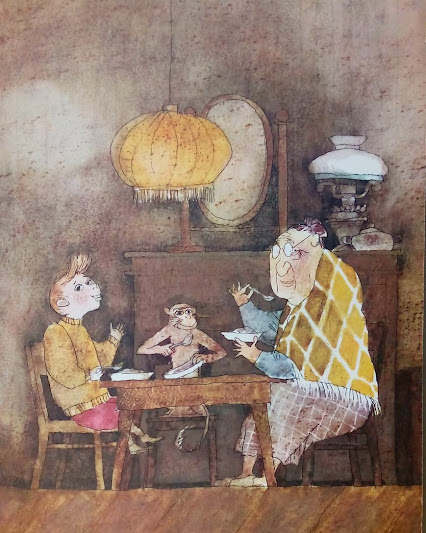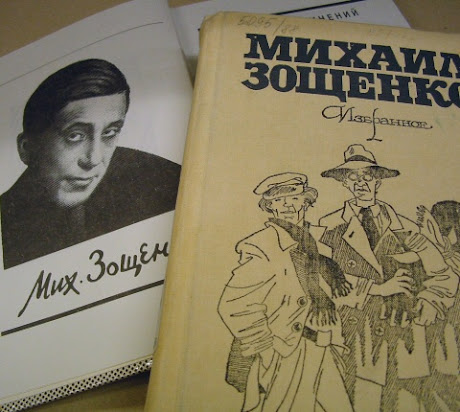"The Adventures of an Ape" - Soviet Satire - A Short Story by Mikhail Zoshchenko
The Adventures of an Ape
Mikhail Zoshchenko was a Russian writer, living from 1895-1958, though being kicked out of the "Union of Soviet Writers" in the 1940's because he work did not fit with the Communist narrative. Zoshchenko with his witty and satirical writing tells the honest truth about the failures of everyday Soviet life. "Candid, spontaneous, immediate, his on-the-spot sketches reveal the Chaplinesque world of the Soviet little man who never wins, victim of himself, of history, of nature, or of all three." (book jacket)
This short story certainly carries that satirical element to it, seemingly making fun of those in this story. Personally, it seems like there are certain Russian phrases and context from the time that are lost on me, so I am sure that I am missing some layers to the sarcasm and satire. That being said, I also cannot say that I fully understand the meaning of the story.
My best interpretation at this time is that Zoshchenko is juxtaposing the ape to the everyday Soviet citizen. The citizens charge and criticize the ape because of the way it acts, not being civilized in their eyes, and yet the "civilization" they have built is absurd. The Fascists are bombing, why wouldn't the ape want to stay in the city frightened and immobile like everyone else? There's a ration line with necessary food stamps, why wouldn't the ape want to wait in line like everyone else? A common bathhouse to shower and washup, why wouldn't the ape want to partake? As Zoshchenko repeats, "He is an ape. He doesn't understand thy whys and wherefores."
At the end the final line made me laugh out loud. Now that the ape is civilized like the rest of them, it now can sit in a room very calmly like a movie ticket taker, eat cereal out of a teaspoon, use a handkerchief to wipe its nose, and truly be called "an educated role-model."
The Story
The setting of this satirical short story is that of a zoo somewhere in Soviet Russia. A bomb dropped by "the Fascists" fell and hit the zoo, killing some of the creatures, scaring others, and flipping the cage of an ape. The ape then escaped the zoo and kept running out of the city to get away. "He fell out onto the path, but did not remain lying there immobile in the manner of people who are used to military activities. ... He ran all the way through the city. He ran out on the highway. He runs along this highway till he leaves the city behind. Well, an ape. It's not a man. He doesn't understand the whys and wherefores. He doesn't see any sense in remaining in this city." Needing to rest, the ape climbed into a tree to nap and look for a little bit of food. A military vehicle passing by saw the ape and stopped to rescue it so that it didn't die. 1
When they arrive in the next city, the truck stops for a minute and during that time the ape escapes and begins to wander in the city. People are surprised and start chasing him, but he outruns them. Finally, he is hungry again so he starts looking for food. "Tormented, he wearied and, naturally, wanted to eat. But in the city, where could he eat? There wasn't anything edible in the streets. With his tail, he could hardly get into a restaurant. Or a co-operative. All the more since he had no money. No discount. Ration coupons he does not have. It's awful. Nevertheless, he got into a certain co-operative. Had a feeling that something was doing there. And they were distributing vegetables to the population: carrots, rutabagas, and cucumbers. He scampered into this store. He sees: There's a long line. No, he did not take a place in this line. Nor did he start pushing people aside in order to shove his way through. He just leaped along the heads of the customers to where the goods were. He leaped on the counter. He didn't ask how much a kilo of carrots cost. And, as the saying goes, that's the kind he was. He ran out of the store, satisfied with his purchase. Well, an ape. Doesn't understand the whys and wherefores. Doesn't see the sense of remaining without rations."
The ape has to, once again, escape a crowd which is chasing him. 2 This time there are children, adults, policemen, and even a dog who are chasing after him. So the ape climbs a wall and just as the dog is about to jump and bite him he hits it on the nose, sending it away yelping. He ends up in a family's yard where there is a teenage boy who has always wanted an ape for a pet. Alesha Popov takes him in. The boys brings him home and takes care of him, but there's one problem, the grandma doesn't like the ape. "... Alesha's grandma took an instant dislike to him. She shouted at the monkey and even wanted to strike him across the paw. All this because, while they were drinking tea, grandma had put a piece of candy she had been chewing on a plate, and the ape had grabbed grandma's candy and tossed it into his own mouth. Well, an ape. It's not a man. A man, if he takes something, wouldn't do it right under grandma's nose." 3
Alesha promises his grandma that he will train the ape. "'I guarantee that the monkey won't eat anything more of yours. I will train it like a person. I will teach it to eat with a teaspoon. And to drink tea out of a glass.'" The day after when Alesha was in school the Grandma let the ape escape. He went along strolling around again. "... he wanted to go have another look at the store to see if there was anything he wanted to buy for himself. Not for money, but just so." While the ape was out he encountered a drunk invalid named Gavrilych. Gavrilych, with the little sense that he had in this drunken state, thought that if he caught the ape he could see it for money enough for much more beer. He was on the way to the bathhouse, though, with his soap and linens. 4
"'Monkey, old friend, old beauty, wouldn't you like to eat a little piece of sugar?' The latter replied: 'Please, yes I would ...' That is, actually, he didn't say anything because he didn't know how to talk. But he simply walked right up, grabbed this little lump of sugar, and started to eat it." He put the ape in his basket with his linens, and the monkey being comfortable, didn't bother to get out. He took the ape into the bathhouse to wash it up as well. The ape enjoyed the warmth, but when the man tried covering him in soap he began to fight and kick as it stung his eyes. He bit the man's finger and ran, creating a commotion throughout the bathhouse and ticketing office until it made it to the street, not least of which because the ape looked like a big white blob. "No one knew it was an ape. They see: something round, white, and foamy has leaped out." 5
A crowd then formed again on the street trying to catch the monkey. Now Alesha had gotten home from school and been in tears that the ape had left. In his sadness he decided to take a walk before then seeing the commotion going on outside in the street. Realizing this white ball was his ape, he ran to it and picked it up in his arms. The crowd gathered around. Gavrilych yelled claiming that it was his monkey because it had bitten him. 6 The boy claimed that it was his as the ape ran to him, showing their relationship. The military driver was in the crowd and interjected himself, but sided with the boy because at least the boy was going to take care of the ape, not sell it for beer money.
"And, so, from that time on, the ape came to live with the boy, Alesha Popov. He's still living with him. Not long ago I took a trip to the city of Borisov. And I purposely went to Alesha's place to see how the ape was getting on. Oh, it was getting along very well indeed! It didn't run away anywhere. It had become very obedient. Wiped its nose with a handkerchief. Doesn't take candy from strangers. So that even grandma is satisfied now and doesn't get mad at it, and no longer wants to move to the zoo. When I entered Alesha's room, the ape was sitting on the table. Sitting there with a sense of importance, like a ticket taker at the movies. And was eating some rice cereal with a teaspoon. Alesha said to me: 'I've educated him like a man, and now all children and even some grown-ups can take him as an example.'"
The end. 7
-------------------
1 - Zoshchenko, Mikhail. Scenes From the Bathhouse. (Ann Harbor. University of Michigan Press, 1961). Pg. 174.
2 - 175
3 - 176
4 - 177
5 - 178
6 - 179
7 - 180






Comments
Post a Comment